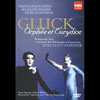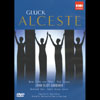Gluck Orphée et Eurydice
Old-fashioned Gluck in spare, minimalist productions still well worth investigating
View record and artist detailsRecord and Artist Details
Composer or Director: Christoph Gluck
Genre:
DVD
Label: EMI Classics
Magazine Review Date: 6/2009
Media Format: Digital Versatile Disc
Media Runtime: 100
Mastering:
Stereo
Catalogue Number: 216577-9

Tracks:
| Composition | Artist Credit |
|---|---|
| Orphée et Eurydice |
Christoph Gluck, Composer
Christoph Gluck, Composer John Eliot Gardiner, Conductor Madeline Bender, Eurydice, Soprano Magdalena Kozená, Orphée, Tenor Monteverdi Choir Orchestre Révolutionnaire et Romantique Patricia Petibon, Amour, Soprano |
Composer or Director: Christoph Gluck
Genre:
DVD
Label: EMI Classics
Magazine Review Date: 6/2009
Media Format: Digital Versatile Disc
Media Runtime: 134
Mastering:
Stereo
Catalogue Number: 216570-9

Tracks:
| Composition | Artist Credit |
|---|---|
| Alceste |
Christoph Gluck, Composer
Anne Sofie von Otter, Alceste, Soprano Christoph Gluck, Composer English Baroque Soloists John Eliot Gardiner, Conductor Monteverdi Choir Paul Groves, Admète, Tenor |
Author: Richard Lawrence
I can tell you all this because I attended the Paris Châtelet productions in 1999 from which these recordings come. You won’t find it in the documentation accompanying the DVDs, because there isn’t any. No synopsis, no background articles, no timings; not even a list of “chapters”, except on-screen. This is even more inadequate than the skimpy leaflets provided by Warner Music Vision, and that’s saying something.
And some detailed help is necessary, because the purchaser, in the case of Orphée et Eurydice, is getting neither pure Gluck nor pure Gluck/ Berlioz. Gardiner follows Berlioz in replacing the final chorus with “Le dieu de Paphos et de Gnide” from Gluck’s last opera, Echo et Narcisse; but he includes the trio “Tendre amour”, which Berlioz dropped, and ignores the abbreviation and reordering, not to mention the oboe, of “Objet de mon amour”. Actually, one has to ask why anybody bothers to exhume the Berlioz version these days. He performed a great service for Gluck, as Rimsky-Korsakov did for Mussorgsky, but the world has moved on and it’s surely time to put such conflations back on the shelf.
Robert Wilson’s production of Orphée et Eurydice is spare, bordering on minimalist. A blue background; cypresses in Act 1; a rock in the bleak Elysian Fields. There are some striking stage pictures, such as Orpheus silhouetted during the Dance of the Furies (another Gardiner restoration, not in fact danced), and the couple positioned on different levels in Act 3. The acting is more movement and gesture than facial expression: effective as far as it goes, but the Blessed Spirits look pretty miserable. One miscalculation is the failure to show Orpheus disobeying the gods’ commands by turning to look at Eurydice, thereby bringing about her second death. Magdalena Kozená, then virtually unknown, sings Orpheus superbly, including the bravura air in Act 1 (orchestrated, incidentally, by Saint- Saëns). The latter is remarkable for the cadenza, a joint effort by Berlioz, Saint-Saëns and Viardot herself. Think of Pooh-Bah’s “Long life to you” in The Mikado combined with the yodellings of the Fiakermilli in Arabella and you will still be only halfway to imagining its full horror. Kozená’s “J’ai perdu mon Eurydice” is splendidly forceful: a cry of rage rather than mere despair. Madeline Bender and Patricia Petibon have much less to do; they do it well, but Petibon is not helped by the variable sound quality.
The two operas are connected by a suspended cube which, seen at the end of Orphée et Eurydice, reappears in the overture to Alceste and many times thereafter. The chorus is heard but not seen: a cop-out, surely, but the dancers replacing the singers on stage provide an unforgettable image when they appear, arms upraised, between the columns of the temple. Silhouette again, and gesture, too. Anne Sofie von Otter, severe, hair scraped back, is the picture of regal dignity at her first appearance. Later, unable to look at the husband for whom she is sacrificing her life, her pain is palpable; at the end, after Apollo has descended with the reprieve, the camera focuses on the gentle smile that she permits herself.
The sharp-eyed will have noticed that two orchestras are employed: same players, different pitch. Even at the lower pitch, some of Alceste’s music is transposed down, as with Janet Baker (Royal Opera House Heritage Series, 10/08). If von Otter, like Baker, is almost unbearably moving in the duets with Admetus, perhaps her finest moment is her scene, alone and terrified, at the entrance to Hades.
Paul Groves as Admetus is almost as eloquent, and Dietrich Henschel, swinging an imaginary club, makes a hearty, no-nonsense Hercules. Both discs are well worth investigating.
Discover the world's largest classical music catalogue with Presto Music.

Gramophone Digital Club
- Digital Edition
- Digital Archive
- Reviews Database
- Full website access
From £8.75 / month
Subscribe
Gramophone Full Club
- Print Edition
- Digital Edition
- Digital Archive
- Reviews Database
- Full website access
From £11.00 / month
Subscribe
If you are a library, university or other organisation that would be interested in an institutional subscription to Gramophone please click here for further information.




